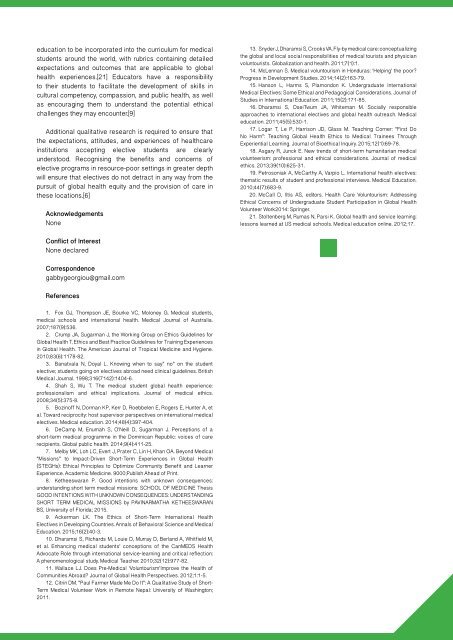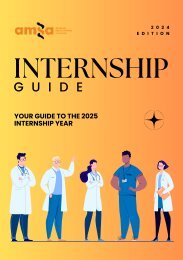Vector Volume 11 Issue 1 - 2017
You also want an ePaper? Increase the reach of your titles
YUMPU automatically turns print PDFs into web optimized ePapers that Google loves.
education to be incorporated into the curriculum for medical<br />
students around the world, with rubrics containing detailed<br />
expectations and outcomes that are applicable to global<br />
health experiences.[21] Educators have a responsibility<br />
to their students to facilitate the development of skills in<br />
cultural competency, compassion, and public health, as well<br />
as encouraging them to understand the potential ethical<br />
challenges they may encounter.[9]<br />
Additional qualitative research is required to ensure that<br />
the expectations, attitudes, and experiences of healthcare<br />
institutions accepting elective students are clearly<br />
understood. Recognising the benefits and concerns of<br />
elective programs in resource-poor settings in greater depth<br />
will ensure that electives do not detract in any way from the<br />
pursuit of global health equity and the provision of care in<br />
these locations.[6]<br />
Acknowledgements<br />
None<br />
13. Snyder J, Dharamsi S, Crooks VA. Fly-by medical care: conceptualizing<br />
the global and local social responsibilities of medical tourists and physician<br />
voluntourists. Globalization and health. 20<strong>11</strong>;7(1):1.<br />
14. McLennan S. Medical voluntourism in Honduras: ‘Helping’ the poor?<br />
Progress in Development Studies. 2014;14(2):163-79.<br />
15. Hanson L, Harms S, Plamondon K. Undergraduate International<br />
Medical Electives: Some Ethical and Pedagogical Considerations. Journal of<br />
Studies in International Education. 20<strong>11</strong>;15(2):171-85.<br />
16. Dharamsi S, OseiTwum JA, Whiteman M. Socially responsible<br />
approaches to international electives and global health outreach. Medical<br />
education. 20<strong>11</strong>;45(5):530-1.<br />
17. Logar T, Le P, Harrison JD, Glass M. Teaching Corner: “First Do<br />
No Harm”: Teaching Global Health Ethics to Medical Trainees Through<br />
Experiential Learning. Journal of Bioethical Inquiry. 2015;12(1):69-78.<br />
18. Asgary R, Junck E. New trends of short-term humanitarian medical<br />
volunteerism: professional and ethical considerations. Journal of medical<br />
ethics. 2013;39(10):625-31.<br />
19. Petrosoniak A, McCarthy A, Varpio L. International health electives:<br />
thematic results of student and professional interviews. Medical Education.<br />
2010;44(7):683-9.<br />
20. McCall D, Iltis AS, editors. Health Care Voluntourism: Addressing<br />
Ethical Concerns of Undergraduate Student Participation in Global Health<br />
Volunteer Work2014: Springer.<br />
21. Stoltenberg M, Rumas N, Parsi K. Global health and service learning:<br />
lessons learned at US medical schools. Medical education online. 2012;17.<br />
Conflict of Interest<br />
None declared<br />
Correspondence<br />
gabbygeorgiou@gmail.com<br />
References<br />
1. Fox GJ, Thompson JE, Bourke VC, Moloney G. Medical students,<br />
medical schools and international health. Medical Journal of Australia.<br />
2007;187(9):536.<br />
2. Crump JA, Sugarman J, the Working Group on Ethics Guidelines for<br />
Global Health T. Ethics and Best Practice Guidelines for Training Experiences<br />
in Global Health. The American Journal of Tropical Medicine and Hygiene.<br />
2010;83(6):<strong>11</strong>78-82.<br />
3. Banatvala N, Doyal L. Knowing when to say” no” on the student<br />
elective; students going on electives abroad need clinical guidelines. British<br />
Medical Journal. 1998;316(7142):1404-6.<br />
4. Shah S, Wu T. The medical student global health experience:<br />
professionalism and ethical implications. Journal of medical ethics.<br />
2008;34(5):375-8.<br />
5. Bozinoff N, Dorman KP, Kerr D, Roebbelen E, Rogers E, Hunter A, et<br />
al. Toward reciprocity: host supervisor perspectives on international medical<br />
electives. Medical education. 2014;48(4):397-404.<br />
6. DeCamp M, Enumah S, O’Neill D, Sugarman J. Perceptions of a<br />
short-term medical programme in the Dominican Republic: voices of care<br />
recipients. Global public health. 2014;9(4):4<strong>11</strong>-25.<br />
7. Melby MK, Loh LC, Evert J, Prater C, Lin H, Khan OA. Beyond Medical<br />
“Missions” to Impact-Driven Short-Term Experiences in Global Health<br />
(STEGHs): Ethical Principles to Optimize Community Benefit and Learner<br />
Experience. Academic Medicine. 9000;Publish Ahead of Print.<br />
8. Ketheeswaran P. Good intentions with unknown consequences:<br />
understanding short term medical missions: SCHOOL OF MEDICINE Thesis<br />
GOOD INTENTIONS WITH UNKNOWN CONSEQUENCES: UNDERSTANDING<br />
SHORT TERM MEDICAL MISSIONS by PAVINARMATHA KETHEESWARAN<br />
BS, University of Florida; 2015.<br />
9. Ackerman LK. The Ethics of Short-Term International Health<br />
Electives in Developing Countries. Annals of Behavioral Science and Medical<br />
Education. 2015;16(2):40-3.<br />
10. Dharamsi S, Richards M, Louie D, Murray D, Berland A, Whitfield M,<br />
et al. Enhancing medical students’ conceptions of the CanMEDS Health<br />
Advocate Role through international service-learning and critical reflection:<br />
A phenomenological study. Medical Teacher. 2010;32(12):977-82.<br />
<strong>11</strong>. Wallace LJ. Does Pre-Medical ‘Voluntourism’Improve the Health of<br />
Communities Abroad? Journal of Global Health Perspectives. 2012;1:1-5.<br />
12. Citrin DM. “Paul Farmer Made Me Do It”: A Qualitative Study of Short-<br />
Term Medical Volunteer Work in Remote Nepal: University of Washington;<br />
20<strong>11</strong>.<br />
43

















